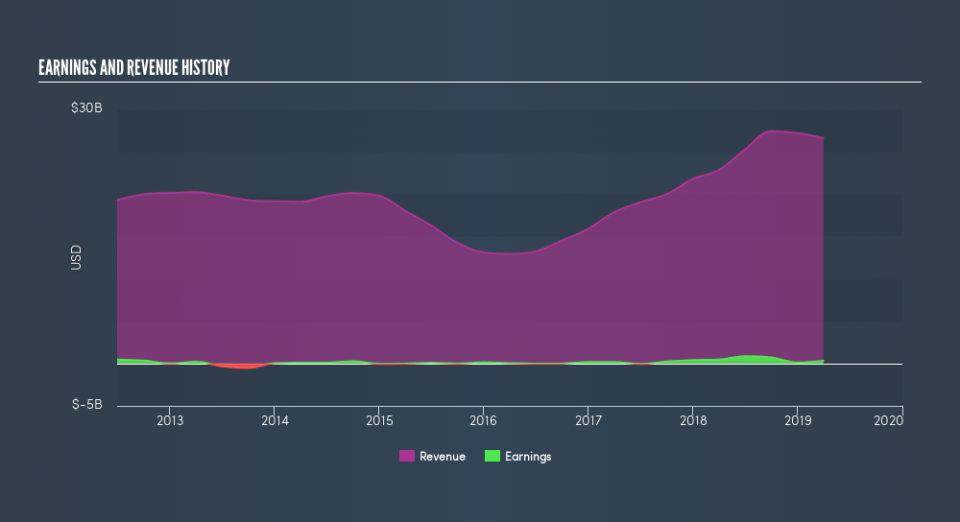Does The PBF Energy Inc. (NYSE:PBF) Share Price Fall With The Market?

Want to participate in a short research study? Help shape the future of investing tools and you could win a $250 gift card!
If you own shares in PBF Energy Inc. (NYSE:PBF) then it's worth thinking about how it contributes to the volatility of your portfolio, overall. In finance, Beta is a measure of volatility. Volatility is considered to be a measure of risk in modern finance theory. Investors may think of volatility as falling into two main categories. First, we have company specific volatility, which is the price gyrations of an individual stock. Holding at least 8 stocks can reduce this kind of risk across a portfolio. The second sort is caused by the natural volatility of markets, overall. For example, certain macroeconomic events will impact (virtually) all stocks on the market.
Some stocks mimic the volatility of the market quite closely, while others demonstrate muted, exagerrated or uncorrelated price movements. Beta is a widely used metric to measure a stock's exposure to market risk (volatility). Before we go on, it's worth noting that Warren Buffett pointed out in his 2014 letter to shareholders that 'volatility is far from synonymous with risk.' Having said that, beta can still be rather useful. The first thing to understand about beta is that the beta of the overall market is one. A stock with a beta below one is either less volatile than the market, or more volatile but not corellated with the overall market. In comparison a stock with a beta of over one tends to be move in a similar direction to the market in the long term, but with greater changes in price.
View our latest analysis for PBF Energy
What PBF's beta value tells investors
Zooming in on PBF Energy, we see it has a five year beta of 1.37. This is above 1, so historically its share price has been influenced by the broader volatility of the stock market. If this beta value holds true in the future, PBF Energy shares are likely to rise more than the market when the market is going up, but fall faster when the market is going down. Many would argue that beta is useful in position sizing, but fundamental metrics such as revenue and earnings are more important overall. You can see PBF Energy's revenue and earnings in the image below.
Could PBF's size cause it to be more volatile?
PBF Energy is a reasonably big company, with a market capitalisation of US$3.5b. Most companies this size are actively traded with decent volumes of shares changing hands each day. It takes deep pocketed investors to influence the share price of a large company, so it's a little unusual to see companies this size with high beta values. It may be that that this company is more heavily impacted by broader economic factors than most.
What this means for you:
Beta only tells us that the PBF Energy share price is sensitive to broader market movements. This could indicate that it is a high growth company, or is heavily influenced by sentiment because it is speculative. Alternatively, it could have operating leverage in its business model. Ultimately, beta is an interesting metric, but there's plenty more to learn. In order to fully understand whether PBF is a good investment for you, we also need to consider important company-specific fundamentals such as PBF Energy’s financial health and performance track record. I highly recommend you dive deeper by considering the following:
Future Outlook: What are well-informed industry analysts predicting for PBF’s future growth? Take a look at our free research report of analyst consensus for PBF’s outlook.
Past Track Record: Has PBF been consistently performing well irrespective of the ups and downs in the market? Go into more detail in the past performance analysis and take a look at the free visual representations of PBF's historicals for more clarity.
Other Interesting Stocks: It's worth checking to see how PBF measures up against other companies on valuation. You could start with this free list of prospective options.
We aim to bring you long-term focused research analysis driven by fundamental data. Note that our analysis may not factor in the latest price-sensitive company announcements or qualitative material.
If you spot an error that warrants correction, please contact the editor at editorial-team@simplywallst.com. This article by Simply Wall St is general in nature. It does not constitute a recommendation to buy or sell any stock, and does not take account of your objectives, or your financial situation. Simply Wall St has no position in the stocks mentioned. Thank you for reading.

 Yahoo Finance
Yahoo Finance 
